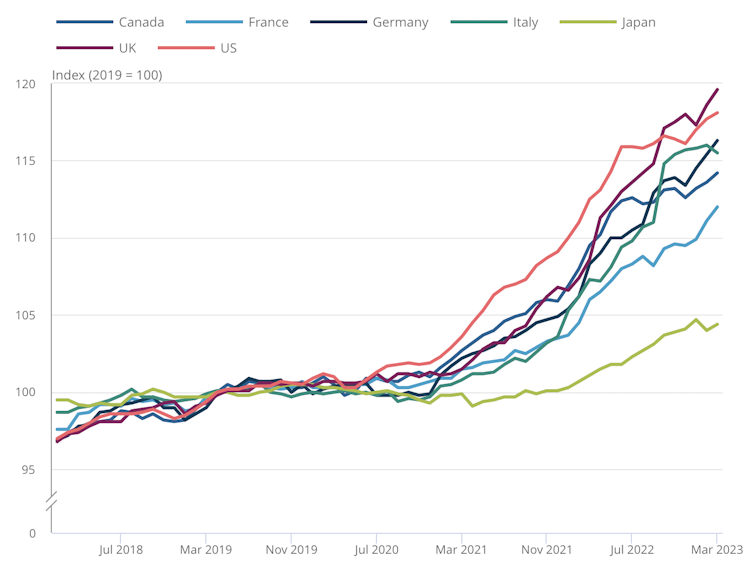Price caps on groceries are not the answer to the UK's inflation problem
- Written by Christoph Siemroth, Associate Professor (Senior Lecturer) in Economics, University of Essex

Prime Minister Rishi Sunak is proposing a form of price caps[1] on basic food items like milk and bread to slow their price increases. This is likely to set maximum prices which sellers are not allowed to exceed, though it appears it would be voluntary.
Price caps are loved by the public: 71% of UK voters supported them in a 2022 poll[2]. But they are equally hated by economists: 75% oppose price caps even in emergency situations, according to another 2022 poll[3]. Why is there such a divide? What are the downsides of price caps?
The UK government is reportedly considering[4] a plan akin to what France did in the spring, where supermarkets were invited to[5] voluntarily freeze or cut prices on selected items to the lowest level possible.
A concern is that voluntary price caps won’t do much. And the danger with introducing price caps below current levels is that some suppliers are likely to drop out of the market and stop supplying. That’s because the capped prices no longer cover their costs. Thus, food price caps could lead to empty supermarket shelves.
There are multiple examples from other countries where price caps have led to shortages:
Zimbabwe ordered price caps on basic goods such as groceries to fight hyperinflation in 2007. The resulting empty supermarket shelves[6] forced shoppers to get in line at 5am to get the bare necessities before stocks ran out.
Hungary capped the price of petrol in 2020. As international oil prices surged after the Ukraine invasion, suppliers could no longer cover their costs. Imports to Hungary dried up, leading to a petrol shortage. Hungary was forced[7] to abandon the price caps to restore supply.
After Berlin capped rents on properties in 2020, the number of flats on the rental market decreased dramatically[8]. San Francisco had a similar experience[9] in the early 1990s.
Alternatives
So what else could be done to bring food prices down? Representatives of the UK supermarkets argue that instead of capping prices, the government should reduce[10] bureaucratic requirements for the industry such as border checks. But can less paperwork really reduce prices?
A London School of Economics study estimates that tougher Brexit border controls since January 2021 increased food prices by 6%[11]. This number does not account for the entire food price increase of 19%[12] within the last year.
Nonetheless, this part of the price increases is a choice. With or without Brexit, the UK could have avoided this problem by having a more liberal border policy, but it didn’t. The EU has erected similar trade barriers against the UK, but the UK is being hit harder because it relies on the EU more for imports than the other way around. This partly explains[13] why UK inflation is the highest among G7 countries.
Consumer price inflation across the G7







